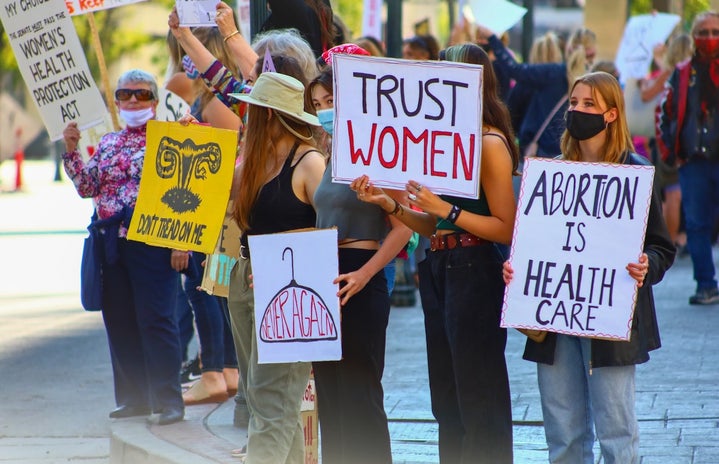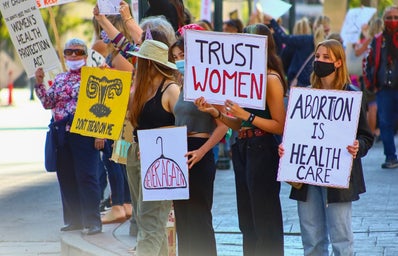TW: This article contains discussions about abortion, rape and sexual assault that some people may find upsetting.
The overturn of Roe v. Wade has plunged women’s rights in America into a dystopian era more akin to a Margaret Atwood novel than modern day. Men deciding women’s rights and what we are permitted to do with our bodies is not a new concept, yet it seems as though 2022 has reopened the door to a plethora of issues that idealise misogyny and inequality. But what does this really mean? And how can we combat oppression of women?
Roe v. Wade was a watershed decision by the U.S. Supreme Court, ruling that the Constitution of the United States ‘conferred’ the right to abortion. It marked the beginning of ongoing and fierce debate on abortion, namely over to whom, when and how abortions could be administered. Religious, political and moral conversation ensued, shaping dialogue on female autonomy. The pseudonym “Jane Roe” was used for Norma McCorvey, a woman pregnant with her third child. She resided in Texas, where abortion was illegal unless it was to save the life of the mother. Eventually, after a court heard the case, they ruled in her favour and the Fourteenth Amendment was issued by the Supreme Court, passing a “fundamental” right to abortion and protecting women’s autonomy in all states.
The case of Roe v Wade was highly controversial. The decades of political, legal, and moral conversation that ensued centred on women’s bodies and the foetuses inside of them. Divided by pro-life and pro-choice rhetoric, American society became polarised by beliefs held about abortion.
Then, on Friday 24th June 2022, the Supreme Court overturned Roe v. Wade, deconstructing 50 years of protections. Automatically, abortion became illegal in many states. On top of this, Justice Clarence Thomas has argued that other landmark rulings should be rethought, including contraception, same-sex relationships and same-sex marriage. This has become a declaration of war on women’s bodies which has the potential to ripple into other margins of society that have fought hard for rights not always attributed to them. Undeniably, the fallout from the overturn of Roe v. Wade will have an unparalleled effect on minority communities, principally due to the disparity in maternal mortality rates among Black women in the US. Critically, childbirth comes with a mortality rate 14 times higher than that of abortion itself, a rate that increases still within Black communities denied appropriate medical care. It is important to remember that making abortions illegal does not stop them from happening, it simply removes the space for them to happen safely. Sepsis, fatality and serious gynaecological issues are only a few of the side effects backstreet abortions can cause.
The issue with the overturn of Roe v. Wade is not simply based on the legality of abortion itself but the lack of choice granted to women in a position of pregnancy. Pregnancy occurs as a bi-product of sexual intercourse, and as we all must be aware, this physical act can occur in many different ways. Hard-line pro-lifers argue consistently that even in cases of rape, the life of the unborn foetus trumps that of the assaulted mother. How can this be allowed to take place? Even during consensual sex pregnancy can occur as a mistake, and anti-abortion activists would argue that a child should be born even when the parents do not have the funding, experience or desire to raise it.
Perhaps the scariest and most disturbing factor in the pro-life vs pro-choice argument is the many men who articulate their desire to control what goes on within the bodies of women. It is a terrifying thought that men can remove women’s rights to choose when they become mothers, yet face no scrutiny for fathering children themselves. Worse still is the parallel that exists in American politics between being anti-abortion and pro-gun. We already know that the lack of strict laws around guns in America has led to 257 school shootings in 2022 alone. Despite this, the right to gun ownership isn’t infringed. It’s almost as if the men who make these laws don’t actually care about the lives of children, but are interested simply in oppressing, containing and constricting women to a life of domesticated motherhood.
The best tool at anyone’s disposal is education. Knowing what the overturn of Roe v. Wade means, and knowing how women’s rights are being infringed daily in America, can lead to knowledge on how to combat the oppressions of patriarchal society. Keep reading, raising awareness, and letting women speak. Fill your reading list with diverse stories of womanhood, and understand the lived female experience.
Written by: Maeve Elizabeth
Edited by: Annabel Cossins-Smith


